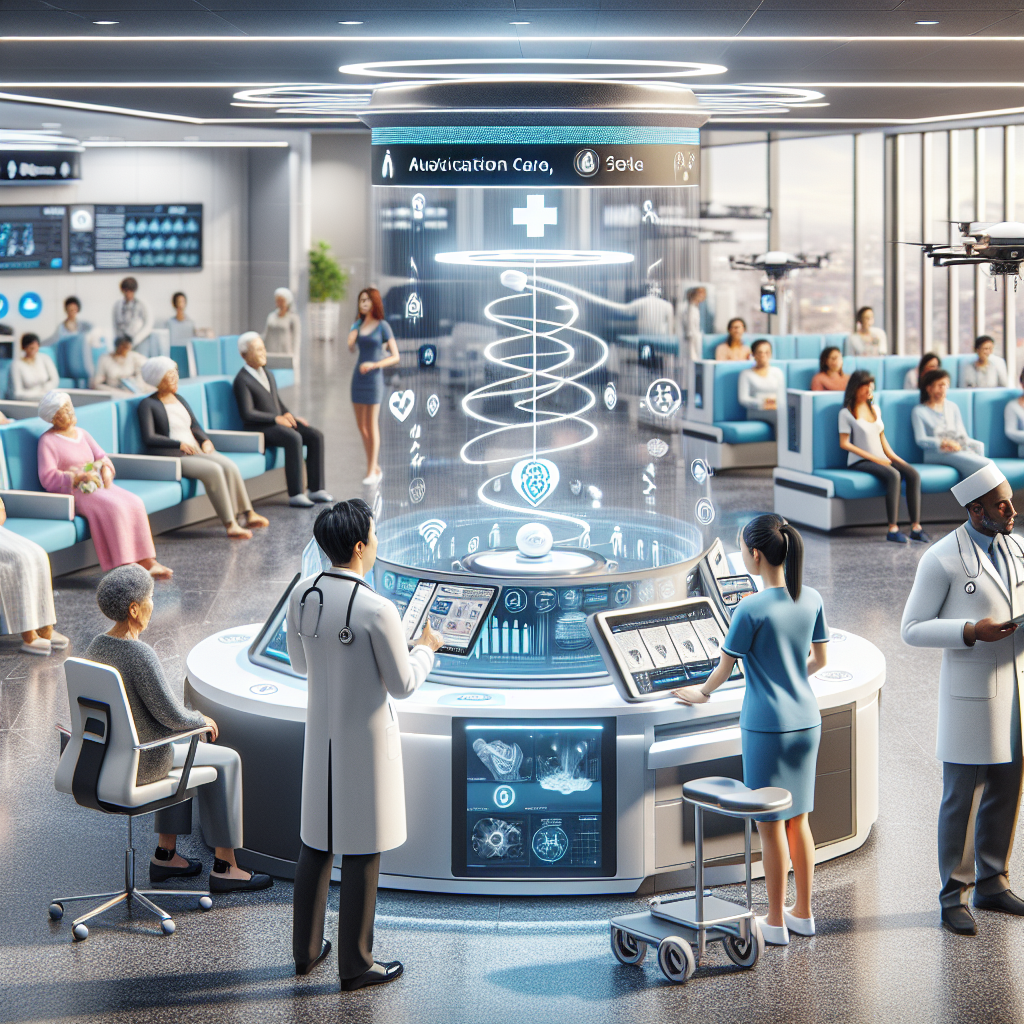South Korea’s Smart Hospitals: Prioritizing Patient Needs and Experiences

South Korea has long been at the forefront of technological innovation, and its healthcare system is no exception. The country’s smart hospitals are a testament to its commitment to integrating cutting-edge technology with patient-centered care. These hospitals are designed to enhance patient experiences, improve healthcare outcomes, and streamline operations. This article delves into the various aspects of South Korea’s smart hospitals, focusing on how they prioritize patient needs and experiences.
1. The Evolution of Smart Hospitals in South Korea
The concept of smart hospitals in South Korea has evolved significantly over the past few decades. Initially, the focus was on digitizing medical records and improving hospital infrastructure. However, with advancements in technology, the scope has expanded to include artificial intelligence (AI), the Internet of Things (IoT), and big data analytics.
South Korea’s journey towards smart hospitals began in the early 2000s when the government recognized the potential of information technology in healthcare. The Ministry of Health and Welfare launched several initiatives to promote the adoption of electronic health records (EHRs) and telemedicine. These efforts laid the foundation for the development of smart hospitals.
Today, South Korea boasts some of the most advanced smart hospitals in the world. These facilities leverage technology to provide personalized care, reduce medical errors, and enhance operational efficiency. The integration of AI and IoT has enabled real-time monitoring of patients, predictive analytics, and automated processes, all of which contribute to a superior patient experience.
One notable example is the Seoul National University Hospital, which has implemented a comprehensive smart hospital system. This system includes AI-powered diagnostic tools, IoT-enabled medical devices, and a centralized data platform that allows for seamless communication between healthcare providers and patients.
- AI-powered diagnostic tools
- IoT-enabled medical devices
- Centralized data platform
The evolution of smart hospitals in South Korea is a testament to the country’s commitment to leveraging technology for the betterment of healthcare. By prioritizing patient needs and experiences, these hospitals are setting new standards for healthcare delivery worldwide.
2. Technological Innovations Enhancing Patient Care
Technological innovations are at the heart of South Korea’s smart hospitals. These innovations are designed to enhance patient care by improving diagnosis, treatment, and overall patient experience. From AI-driven diagnostic tools to IoT-enabled medical devices, technology is transforming the way healthcare is delivered in South Korea.
AI is playing a crucial role in enhancing patient care in smart hospitals. AI algorithms are used to analyze medical images, predict patient outcomes, and recommend personalized treatment plans. For instance, AI-powered diagnostic tools can detect diseases such as cancer at an early stage, allowing for timely intervention and improved patient outcomes.
IoT-enabled medical devices are another key component of smart hospitals. These devices allow for real-time monitoring of patients’ vital signs, enabling healthcare providers to respond quickly to any changes in a patient’s condition. For example, wearable devices can track a patient’s heart rate, blood pressure, and oxygen levels, providing valuable data that can be used to optimize treatment plans.
Big data analytics is also playing a significant role in enhancing patient care. By analyzing large volumes of data, healthcare providers can identify patterns and trends that can inform clinical decision-making. This data-driven approach allows for more accurate diagnoses, personalized treatment plans, and improved patient outcomes.
- AI-driven diagnostic tools
- IoT-enabled medical devices
- Big data analytics
Overall, technological innovations are transforming patient care in South Korea’s smart hospitals. By leveraging AI, IoT, and big data analytics, these hospitals are able to provide personalized, efficient, and effective care that prioritizes patient needs and experiences.
3. Patient-Centered Design and Infrastructure
In addition to technological innovations, South Korea’s smart hospitals are also characterized by their patient-centered design and infrastructure. These hospitals are designed with the patient in mind, ensuring that every aspect of the hospital environment contributes to a positive patient experience.
One of the key features of patient-centered design is the use of smart rooms. These rooms are equipped with advanced technology that allows patients to control their environment, access information, and communicate with healthcare providers. For example, patients can use a tablet to adjust the lighting, temperature, and entertainment options in their room, creating a comfortable and personalized environment.
Smart hospitals also prioritize accessibility and convenience for patients. This includes features such as easy-to-navigate layouts, clear signage, and digital wayfinding tools. These elements help reduce stress and anxiety for patients and their families, making their hospital experience more pleasant and manageable.
Furthermore, smart hospitals are designed to promote healing and well-being. This includes incorporating natural light, green spaces, and calming color schemes into the hospital environment. Research has shown that these elements can have a positive impact on patient recovery and overall well-being.
- Smart rooms with advanced technology
- Accessibility and convenience features
- Healing and well-being-focused design
By prioritizing patient-centered design and infrastructure, South Korea’s smart hospitals are able to create a supportive and healing environment that enhances the patient experience. This focus on patient needs and experiences is a key factor in the success of these hospitals.
4. Enhancing Patient Engagement and Communication
Effective communication and patient engagement are critical components of high-quality healthcare. South Korea’s smart hospitals are leveraging technology to enhance communication between patients and healthcare providers, as well as to engage patients in their own care.
One way smart hospitals are enhancing communication is through the use of digital platforms and mobile apps. These tools allow patients to access their medical records, schedule appointments, and communicate with their healthcare providers from the comfort of their own homes. This not only improves convenience for patients but also ensures that they have access to important information about their health.
Telemedicine is another key component of patient engagement in smart hospitals. By offering virtual consultations, patients can receive medical advice and treatment without having to visit the hospital in person. This is particularly beneficial for patients with chronic conditions or those living in remote areas, as it reduces the need for frequent hospital visits.
Smart hospitals are also using technology to engage patients in their own care. This includes providing patients with access to educational resources, such as videos and articles, that help them understand their condition and treatment options. By empowering patients with knowledge, smart hospitals are encouraging them to take an active role in their own healthcare.
- Digital platforms and mobile apps
- Telemedicine and virtual consultations
- Patient education and empowerment
By enhancing patient engagement and communication, South Korea’s smart hospitals are able to provide more personalized and effective care. This focus on patient needs and experiences is a key factor in the success of these hospitals.
5. Case Studies: Leading Smart Hospitals in South Korea
Several smart hospitals in South Korea are leading the way in prioritizing patient needs and experiences. These hospitals serve as examples of how technology and patient-centered design can be integrated to provide high-quality healthcare.
The Seoul National University Hospital is one of the most advanced smart hospitals in South Korea. It has implemented a comprehensive smart hospital system that includes AI-powered diagnostic tools, IoT-enabled medical devices, and a centralized data platform. This system allows for real-time monitoring of patients, predictive analytics, and automated processes, all of which contribute to a superior patient experience.
Another leading smart hospital is the Samsung Medical Center. This hospital has implemented a range of technological innovations, including AI-driven diagnostic tools, telemedicine services, and a patient-centered design. The hospital’s focus on patient needs and experiences has resulted in improved patient outcomes and high levels of patient satisfaction.
The Asan Medical Center is also a leader in smart hospital innovation. It has implemented a range of technologies, including IoT-enabled medical devices and big data analytics, to enhance patient care. The hospital’s focus on patient-centered design and infrastructure has also contributed to its success in providing high-quality healthcare.
- Seoul National University Hospital
- Samsung Medical Center
- Asan Medical Center
These case studies demonstrate the potential of smart hospitals to transform healthcare delivery in South Korea. By prioritizing patient needs and experiences, these hospitals are setting new standards for healthcare worldwide.
Conclusion
South Korea’s smart hospitals are at the forefront of healthcare innovation, leveraging technology to prioritize patient needs and experiences. From AI-driven diagnostic tools to patient-centered design, these hospitals are transforming the way healthcare is delivered. By enhancing patient care, engagement, and communication, smart hospitals are setting new standards for healthcare delivery worldwide. As technology continues to advance, South Korea’s smart hospitals will undoubtedly continue to lead the way in providing high-quality, patient-centered care.





